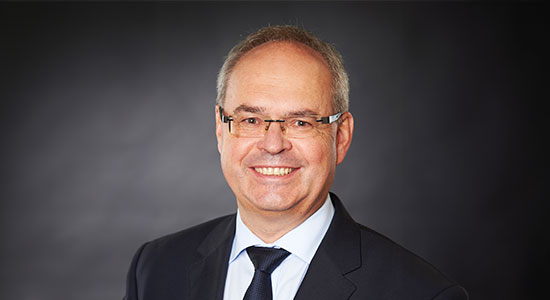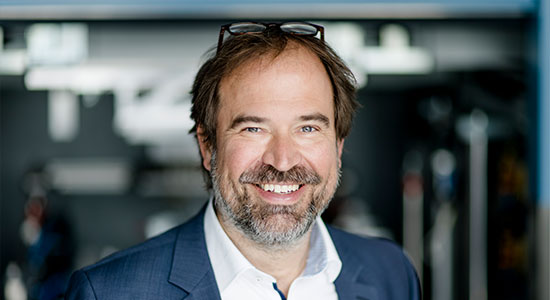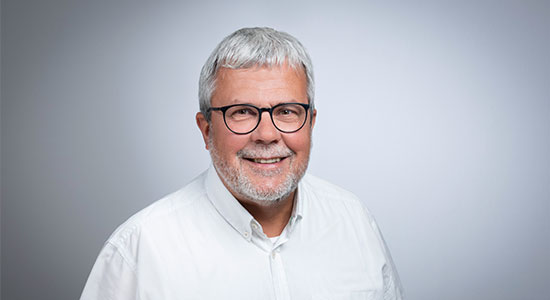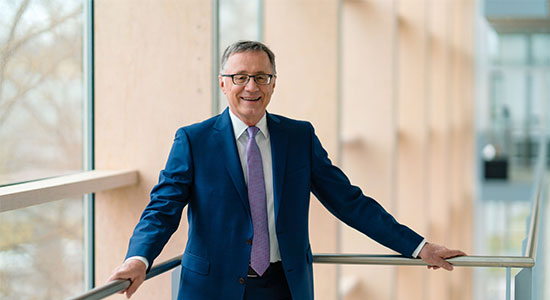
Giving one’s best in the here and now, managing day-to-day business efficiently and effectively – these are important aspects of business success. At the same time, companies are well advised to look beyond the present so as not to be overtaken by relevant developments. Ambidexterity is the ability to combine both of these; An important principle at LAPP. The LAPP Technology Advisory Board also acts with this in mind: four renowned scientists support the LAPP Board of Management in identifying technological trends at an early stage so that the company can adapt to them today and will be able to in the future.
More than a decade of shaping the technological future
A “fireside chat” with high-profile professors as well as LAPP board and family representatives – this was the idea of Siegbert Lapp, the eldest son of the company’s two founders, Oskar and Ursula Ida Lapp, on calling together the Technology Advisory Board in 2010. The experts were to support the Board of Management and the family in looking to the technological future by highlighting and classifying relevant trends, giving tips on how to develop the organisation and the business segment, as well as by encouraging cooperation and opening up contacts with political, business and scientific networks.
Since then, 46 advisory board meetings have been held, usually three or at maximum four per year, along with excursions to institutes and cooperation partners. The board, made up of four scientific experts, provided information on relevant technology trends such as carbon nanotubes (CNT), direct current, Artificial Intelligence and Predictive Maintenance, which often led to specific innovation projects at LAPP. The Advisory Board was also involved in setting up innovation structures, e.g. the Stage Gate process. In January 2023, a workshop was held to realign the Technology Advisory Board, where a decision was taken to align it more closely with LAPP’s day-to-day business and process landscape.
An overview of the scientists involved
Prof. Dr Jürgen Fleischer has held the Chair in Manufacturing and Assembly Technology and has been head of the Institute of Production Technology at the Karlsruhe Institute of Technology (KIT) for over 20 years. Since 2016, he has been a member of the Technology Advisory Board. His highlight in this context to date? “The trip to AIRBUS was great. When I suggested developing and using an intelligent stringer with embedded cable sets for aircraft construction, Siegbert Lapp immediately got involved. We tried to do this as an aviation research project, but unfortunately it did not work. The idea was good anyway.“
Prof. Dr. Dietmar Drummer has held the Chair for Plastics Technology at the University of Erlangen-Nuremberg since 2009. He has been a member of the advisory board since the outset. Speaking of his work, he said: “I really value the openness and breadth of the technical discussions on the Advisory Board. It means materials, technologies and systems are evaluated in the same way, but always classified in terms of technological maturity and market developments too.“


Prof. Dr Frank Berger has been a professor in the field of “Electrical devices and systems” at the Technical University of Ilmenau since 2003. He also joined the Technology Advisory Board at the outset. He appreciates the “constructive and creative exchange of views on many innovative issues and the interesting tours and excursions, e.g. to Câbleries Lapp in Forbach, LAPP Tech AG in Diessenhofen or the facilities in Erlangen and at the Fraunhofer Institutes.”
Prof. Dr.-Ing. Wilhelm Bauer has been Head of the Fraunhofer Institute for Industrial Engineering and Organisation (IAO) and Deputy Head of the Institute for Industrial Engineering and Technology Management (IAT) at the University of Stuttgart since 2013. He is likewise a founding member. He commented: “I found it impressive how the Stage Gate process was introduced shortly after the Tech Advisory Board was set up on our recommendation and that the LAPP technology radar was subsequently added. This has left a lasting impression on us that people at LAPP listen and then act quickly.“


There is a close partnership between the academic advisors and LAPP management, which is characterised by an open and trusting exchange. The institution is therefore indispensable for the future and will continue to increase the awareness of LAPP’s management and create an awareness for relevant research projects. This means that LAPP can always act according to the pulse of the times or look beyond the horizon of the present day – in this way, its ability to innovate and its customer focus are guaranteed in the long term.
